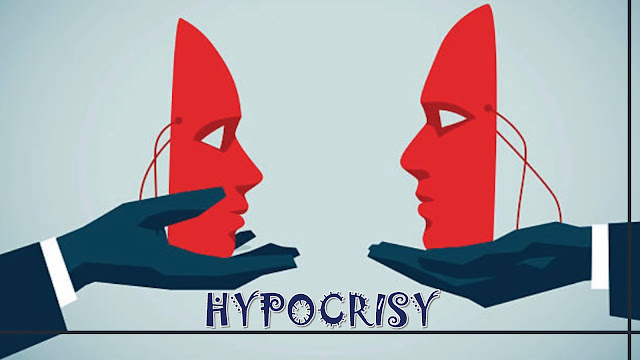COGNITIVE DISSONANCE OF HYPOCRITES
This age is full of shams. Pretense never stood in such an eminent position as it does at the present hour. There are few, I fear, who love the naked truth. Counterfeit has at length attained to such an eminence that it is with the utmost difficulty that you can detect it. The counterfeit so near resembles the genuine, that the eye of wisdom itself needs to be enlightened before she can discern the difference.
Hypocrisy is defined as the practice of claiming to have moral standards or views to which one’s own behavior (or the behavior of people in our family or tribe) does not meet. It is a pretense of morality that cloaks our inability to meet some predetermined moral code.
It is the practice of engaging in the same behavior or activity for which one criticizes another or the practice of claiming to have moral standards or beliefs to which one’s own behavior does not conform. In moral psychology, it’s the failure to follow one’s own expressed moral rules and principles.
We accuse one person of doing exactly what we are doing but believe that it is somehow “different” when that person does it. It is typically caused by an inflated sense of ego and self-righteousness, coupled with an inability to be humble.
At the root of hypocrisy is fear and low self-esteem. We use hypocrisy to cover up our own shortcomings and figure out our part in it. It typically stems from a sincere belief that we should not be held to the same standards as others because we have better intentions.
Fueling hypocrisy is the mindset that lends itself to the erroneous belief that the ailing kleptomanic dotard that we support is the most honorable and honest candidate to run for president. It’s subscribing to the false notion that my tribe is more noble and loving than the people from other tribes who are living amongst us.
It feels good to be morally superior to someone else. It helps us to avoid humility, which is a very painful emotion. It’s a deflection to avoid dealing with our own problems because we don’t want to be judged. Hypocrisy helps us avoid looking in the mirror.
At the root of hypocrisy is a strong desire to be loved and accepted. The fear of humility and judgment is so powerful, that we use doublethink and cognitive dissonance to avoid facing ourselves.
To stop being a hypocrite, we must first examine our own moral code and determine whether there are any contradictions in it. We each need to ask the question, “Am I a phony or a fraud?”
Objective morality is the best tool to help us overcome hypocrisy. This is the belief that meaning is not open for interpretation, and that something is true regardless of who is involved in a situation.
In other words, stealing is wrong in and of itself even if a few pennies fall off from the bullion van of the thief’s loot. Political thuggery is evil regardless of whether it’s your own motor park thug that’s the perpetrator. Rigging elections is morally reprehensible and ethically appalling, even if it’s your leader, the Chicago drug cartel baron, that’s allocated more votes.
Hypocrisy is a sickness of the soul. All those who are afflicted ought to go on their knees in repentance and cry to God for forgiveness.
(Sources: Charles Spurgeon, Straight Talk, and Wikipedia)



Comments
Post a Comment